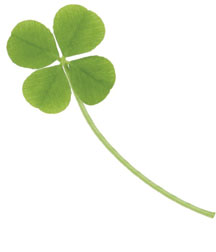Observation
We Can All Share in the Luck of the Irish
 We all have our lucky charms. Whether it’s a four leaf clover, rabbit’s foot, or that “lucky” T-shirt we can’t seem to part with, our charms are with us in times of need. Superstitions may seem like irrational hocus-pocus, but a study published in Psychological Science found that having a lucky charm does in fact enhance performance.
We all have our lucky charms. Whether it’s a four leaf clover, rabbit’s foot, or that “lucky” T-shirt we can’t seem to part with, our charms are with us in times of need. Superstitions may seem like irrational hocus-pocus, but a study published in Psychological Science found that having a lucky charm does in fact enhance performance.
Psychological scientists at the University of Cologne, Germany, found that volunteers who used a “lucky ball” performed better in a subsequent golf putting task than participants who used a neutral ball. Similarly, volunteers who kept their fingers crossed finished a dexterity task faster than participants in a control condition did.
So why do lucky charms work? Having a lucky charm on hand heightens a person’s perceived self-efficacy — that is, their feeling of confidence to master an upcoming task. Carrying a lucky charm seems irrational, but the boost of confidence it brings can really improve your performance.
Damisch, L., Stoberock, B., & Mussweiler, T. (2010). Keep your fingers crossed! How superstition improves performance. Psychological Science, 21, 1014–1020.





APS regularly opens certain online articles for discussion on our website. Effective February 2021, you must be a logged-in APS member to post comments. By posting a comment, you agree to our Community Guidelines and the display of your profile information, including your name and affiliation. Any opinions, findings, conclusions, or recommendations present in article comments are those of the writers and do not necessarily reflect the views of APS or the article’s author. For more information, please see our Community Guidelines.
Please login with your APS account to comment.